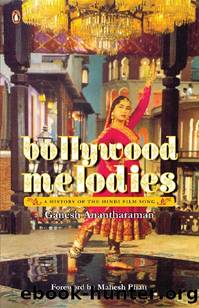Bollywood Melodies by Ganesh Anantharaman

Author:Ganesh Anantharaman [Anantharaman, Ganesh]
Language: eng
Format: epub
ISBN: 9789386495310
Publisher: Random House Publishers India Pvt. Ltd.
Published: 2008-02-13T18:30:00+00:00
javed akhtar: in pursuit Of first love
It was 1942âA Love Story in the early 1990s that put the erstwhile scriptwriter, who assiduously built Amitabhâs persona as the âangry young manâ in the 1970s through his screenplays in partnership with Salim, in the reckoning as a top lyricist of Bollywood. You wonder why Javed Akhtarâs work as lyricist in the preceding decade is almost invisible, though he wrote quite a few memorable songs, beginning with âYeh kahan aa gaye humâ and âNeela asmaan so gayaâ in Silsila (1981). Perhaps it had to do with the overall decline in music in the 1980s. Javed started out his career as lyricist in a decade when even established lyricists such as Indeewar had succumbed to writing âJhopdi mein charpayeeâ (Mawaali, 1982).
If Silsila gave you a taste of the manâs flair for poetry, small-budget Saath Saath the following year confirmed that the man who wrote feisty screenplays could also turn a sublime poet. After all, the son of Jan Nisar Akhtar, who wrote simple but potent lyrics for O.P. Nayyar in the 1950s and 1960s, knew heâd be measured against his fatherâs output. If âKyon zindagi ki raah mein majboor ho gayeâ (Chitra Singh) was a pain-lashed lament over the loss of ideals and the consequent estrangement in a relationship, âTumko dekha to yeh khayal aayaâ (Jagjit Singh) was about all the longing, all the uncertainties of first love. Barring Arth, Jagjit rarely came close to sounding so effective in films, and young Javedâs wordsâAaj phir dil ne ek tamanna ki/Aaj phir dil ko humne samjhaaya/Zindagi dhoop tum ghanaa saayaâhad much to do with it.
Javed captured the idealism of youth, their spirit of âraring to goâ brilliantly in the song âZindagi aa raha hoon mainâ in Mashaal (scored by Hridaynath Mangeshkar, sung by Kishore, 1984), with the telling words âMere haathon ki garmi se/Pighal jaayengi zanjeerein/Mere qadmon ki aahat se/Badal jayengi taqdeerein/Umeedon ke diye lekar/Ye sab tere liye lekar/Zindagi aa raha hoon mainâ. A pity the film bombed, despite convincing performances by Dilip Kumar and Anil Kapoor, and the best solo of Kishore Kumar in his last years.
With Saagar (1985) began Javedâs tryst with commercial cinema, and the fledgling lyricist showed an ability to manage the tightrope between artistic integrity and commercial success, penning âJaane do naâ as his bow to trade, even while writing the more polished âSagar kinaare dil yeh pukaareâ. This was followed by more tepid songs in Arjun (1985), Mr. India (1987) and Tezaab (1988), all three taking the lyricist on a spiral of popularity, even as he was steadily rubbishing poetry with lyrics as trite as âMammaiyya kero kero kero mammaâ (Arjun), âHawaa hawaaiâ (Mr. India) and âEk do teenâ (Tezaab). Mercifully, Javed seems to have realized this himself, and took a long break of five years before he came up with genuine poetry in 1942âA Love Story. In âKuch na kahoâ and âPyaar hua chupke seâ you find again the promise he displayed in Saath Saath a decade earlier.
With
Download
This site does not store any files on its server. We only index and link to content provided by other sites. Please contact the content providers to delete copyright contents if any and email us, we'll remove relevant links or contents immediately.
Annie Bot by Caragh M. O’Brien(294)
The Who by Summertime Blues(266)
The Cello and the Nightingales by Beatrice Harrison(240)
Record, Mix and Master by Simon Duggal(234)
Bass Lines by Bob Cranshaw(229)
Music as Medicine: The History of Music Therapy since Antiquity by Horden Peregrine (Editor)(229)
Lead Sister by Lucy O'Brien(228)
The Doors : the complete illustrated lyrics by Unknown(209)
Diction for Singers: A concise reference for English, Italian, Latin, German, French, and Spanish pronunciation by Joan Wall Robert Caldwell Tracy Gavilanes Sheila Allen(199)
Life by The Grateful Dead 2019(199)
Fantasists on Fantasy (1984) by Robert Boyer && Kenneth Zahorski (Eds.)(183)
Traditional Gaelic Bagpiping, 1745-1945 by John G. Gibson(183)
Buddy Holly A Biography by Ellis Amburn(174)
Syntheses, crystal structure, spectroscopic characterization and antifungal activity of novel dibutylbis(N-R-sulfonyldithiocarbimato)stannate(IV) complexes by unknow(170)
Syntheses, structures and magnetic properties of five iron(II) coordination polymers with flexible bis(imidazole) and bis(triazole) ligands by Xia Zhu & Xin-Yi Wang & Bao-Long Li & Ju Wang & Song Gao(168)
Julian Cope by Krautrocksampler (1995)(156)
Erik Satie. Music, Art and Literature by Caroline Potter(152)
Choral Singing : Histories and Practices by Ursula Geisler; Karin Johansson(152)
Our Sound Is Our Wound by Winkett Lucy;(130)
